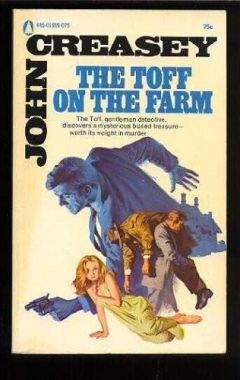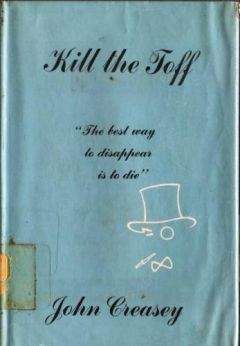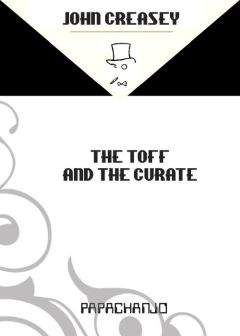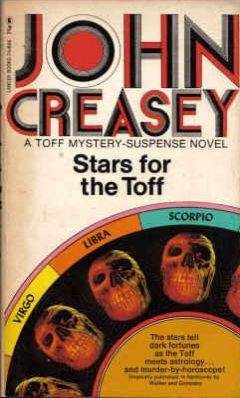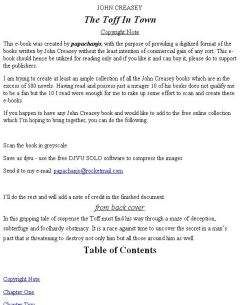John Creasey - The Toff and The Sleepy Cowboy
На электронном книжном портале my-library.info можно читать бесплатно книги онлайн без регистрации, в том числе John Creasey - The Toff and The Sleepy Cowboy. Жанр: Прочее издательство неизвестно, год 2004. В онлайн доступе вы получите полную версию книги с кратким содержанием для ознакомления, сможете читать аннотацию к книге (предисловие), увидеть рецензии тех, кто произведение уже прочитал и их экспертное мнение о прочитанном.
Кроме того, в библиотеке онлайн my-library.info вы найдете много новинок, которые заслуживают вашего внимания.
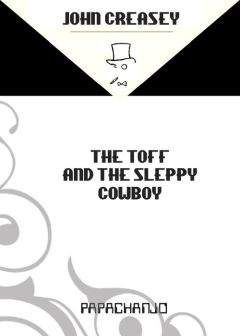
John Creasey - The Toff and The Sleepy Cowboy краткое содержание
The Toff and The Sleepy Cowboy читать онлайн бесплатно
“No, sir,” repeated Loman. “I kept those papers in an envelope in my pocket, I didn’t want to take any chances with them. You think that’s what the thieves were after?”
“I think it could have been,” answered Rollison slowly, and he went on, hardly daring to ask : “Have you any copies of these documents?”
“No,” answered Loman. “Why would I want copies when I have the genuine article?”
“Some people play safe,” Rollison remarked heavily. “Were you carrying anything else in your pockets?”
“I guess not — I got everything else back at the airport.”
Rollison asked, out of the blue: “What was your grandfather’s name?”
“Joseph.”
“Joseph what?”
“Joseph Loman, what else?”
“It could have been on your mother’s side,” Rollison pointed out. “Did you —?”
“There was something else!” cried Loman. It did not occur to him to wait but whenever a thought came into his head he interrupted in the most natural way. “I’d forgotten, I guess. There were some old photographs.”
“Of you?”
“Are you crazy? Of my grandfather and his wife. They were pretty old, those brown-coloured prints, what do you call them? Sepia, that’s the word, sepia. I’ve had them ever since my pa handed them to me just before he died. Had them in a special folder,” Tommy Loman added. “It was too big for my billfold so I put them in this envelope so they could all go into my pocket.” His eyes glowed with this happy recollection, but the Toff’s heart sank.
“Tommy,” he said.
“Yes?”
“Do you have any brothers?”
“No, sir. No brothers, no sisters.”
“Cousins?” asked Rollison.
“I’ve never heard of any relatives any place,” answered Loman.
“No one at all like you?”
“Richard,” stated Loman with great certainty, “there ain’t nobody like me, any place.”
“I can believe it,” Rollison replied feelingly, and he moved towards the tall man, going on in an even voice. “Tommy, I am only guessing but it looks to me like a good guess. You appear to stand to inherit a lot of money — that’s the simple and obvious explanation. If someone wants to prevent you from getting it, then the obvious means would be to impersonate you. That could be done safely only by killing you or keeping you out of the way until the inheritance had been claimed and paid over. The simple way would be to kill you but not until they had these documents and photographs. From now on, if I’m anywhere on course, so far as these impersonators are concerned you would be far better dead.”
The word ‘dead’ hovered about the room and seemed to echo from the trophies on that resplendent wall. As it hovered, Rollison looked into Tommy Loman’s light brown eyes. The younger man’s face was blank, he looked almost as if he had not taken in everything that Rollison said.
But he had taken it in, for he said: “It would make sense, I guess, if you had written and told me about a legacy. But you didn’t. So who did? And who told me to come see you?”
“That we shall find out.”
“And who tried to blow you up?” asked Loman. “You, Richard, not me.”
“We shall find that out, too,” Rollison promised. “We have found out one thing: you are in danger.” After a long pause, Loman said: “So?”
“So, we must look after you.”
“I’m good at looking after myself,” Loman retorted laconically.
“On a cattle ranch, I am sure you are. But in an aeroplane?” Loman opened his mouth to reply, but closed it again. “Or in London, a strange city where you don’t even know the rule of the road?”
Resignedly, the other said: “So how are you going to protect me?”
“In the first place, have you stay here,” Rollison began. “Then —”
“Richard,” interrupted Loman, spreading his hands, “do you know what claustrophobia is? Do you know what it feels like to be in a big city surrounded by bricks and stone when you’re accustomed to riding a range where all you can see are mountains and saguaro cacti and dirt?”
“I can imagine,” Rollison conceded.
“This is a nice room,” stated Loman. “But.”
“It won’t be for ever,” Rollison said.
“It can’t be for long, Richard. And there’s another thing.”
“What’s that?”
“When I’m in trouble I like to do my own protecting.”
“Yes,” Rollison said levelly. “Yes, I am sure you do. However, you must stay here the rest of the day and tonight, at least. I may be able to find out what’s really behind all this if I have a little time. At seven o’clock we shall have company —” He called across to Jolly, who was clearing the table. “Did I tell you that Miss Brown will be here for dinner, Jolly?”
“No, sir,” Jolly replied, and straightened up with a crumb tray in one hand, crumb brush in the other. “Then I should go and do a little shopping.”
“Hey!” exclaimed Loman, in sudden excitement. “What’s the matter?” demanded Rollison.
“I can go out with Mr. Jolly! He can look after me.” A glint of merriment showed in the tall man’s eyes.
“Tommy,” Rollison said very softly, “I don’t think you understand. The evidence is that you are in grave danger. Until we know what kind of danger you need to take extreme precautions. We know that the people involved are prepared to throw an explosive grenade, and if they’ll do it once they might again. If you want to go out and risk your neck, I shan’t stop you. But I won’t risk Jolly’s. I’m not yet sure it’s worth it.”
Very slowly and deliberately, Tommy Loman backed away and at the same time raised his hands.
“I can say one thing about you,” he said in a husky voice. “You speak straight and you act fast. You want me to stay here that bad?”
“I think you would be wiser to stay here,” Rollison answered.
“Okay, then I’ll stay,” promised Loman, reluctantly. “If I change my mind I’ll tell you. Are you going to have the place surrounded?” The amused glint appeared in his eyes again.
“Yes,” answered Rollison.
“Jehosophat!” exclaimed Loman. “You mean it!”
“I mean it,” confirmed Rollison, turning to Jolly. “Call Bill Ebbutt and ask for some of his chaps, Jolly, then tell Mr. Grice what I’ve done and why — because I think Mr. Loman’s life is in acute danger.”
“And isn’t yours, sir?” asked Jolly, very earnestly. “And if it is, isn’t it simply because you are helping a complete stranger, who really has no call on you at all?”
9
The Short and the Tall
ROLLISON DID NOT REPLY but looked at Thomas G. Loman, who actually backed a pace, as if Jolly had delivered him a physical blow. His face showed a whole gamut of expressions, from shock to unbelief; until at last he turned to Rollison and spoke with unmistakable feeling.
“And I said that you talk straight.”
“When one is dealing with life and death, as Mr. Rollison and I have been for many years, one has to talk very straight indeed,” said Jolly.
“Sure,” conceded Loman. “You bet!” He flashed his most attractive grin. “I’ll be good,” he promised. “But if you two go out and leave me alone I don’t promise not to prowl around.”
“Prowl wherever you like,” Rollison said. “Are you going to look for anything in particular?”
“All I can find out about you and Mr. Jolly.”
“In the cupboards beneath the Trophy Wall you will find press cuttings books and case histories. Help your-self.” Rollison pointed to three cupboards with sliding doors beneath a wide ledge about the height of his desk on the wall, then turned to Jolly. “Show Mr. Loman our safety measures, won’t you?” He smiled at Loman and then turned and walked briskly out of the room.
He went to his bedroom and knelt down beside a big wardrobe, opened the doors and then a drawer at the bottom, pressed a knot in the wood at one side and allowed a false bottom to slide back smoothly and with little sound.
Hidden here were weapons in great variety.
He selected a small pistol not unlike the one which Pamela Brown had in her bag, and four cigarettes which he placed carefully into his gold cigarette case. Each cigarette was in fact a tiny blow-pipe and inside it not a dart but a phial of tear gas; that little invention, thought up over twenty years ago, had saved his life times out of number. He picked up a narrow, stiletto dagger clipped into an arm band. This would fit comfortably below the elbow, from where he could work it down towards his hand by flexing his muscles. He put this back again, saying: “Not this jaunt,” and left the flat by the other passage, hearing Jolly talking to Tommy G. He glanced up at the periscope mirror and satisfied himself no one was on the staircase or the landing, then went out.
Just outside the street door stood one of Grice’s men, another stood on the far side of the street, making no secret of their presence, and returning Rollison’s amiable nod. Police protection, Rollison thought half-bleak, half-amused. He saw a third man who did not look like a policeman, farther along the street.
On the instant, he was prepared for trouble.
The man was of medium height, chubby rather than fat, and he wore a pale coloured suit, of a peculiar shade of blue grey. That, and his hat, betrayed him as an American; or at least that he had bought these clothes in America. The man took a step from a wall in front of one of the houses, and Rollison’s alarm signals faded; at least the other was not attempting to hide himself.
“Excuse me,” the man said, quietly. He was un-mistakably American.
“Can I help you?” Rollison asked.
“Can you —” there was a moment’s hesitation before the speaker went on. “Can you tell me where Piccadilly is?”
Rollison was as nearly sure as he could be that his accoster had switched questions at the last moment. He looked into the healthy, olive-skinned complexion and the honey brown eyes as he answered.
“That’s very easy. Go along there —” he pointed —”take the first left and then the first left again. It’s no more than a hundred yards.”
“Thank you,” the man said, and turned and walked off.
Rollison got into his car, so pre-occupied that he hardly noticed the dents and holes in the body, eased out of the parking place and went in the opposite direction to that of the American. He did not notice the two detectives, drove by side streets towards Park Lane and finally into Hyde Park, joining a fast-moving stream of traffic. Grice’s men were obviously watching both the flat and Loman. Soon, he was driving along the Edgware Road, with its small shops and its crowds, then along a street which was cut in two by a stream of water: the Regent’s Canal; for a few hundred yards, the countryside seemed to be in the heart of London. Somehow, the hint of rural England was more impressive here than in the great parks themselves.
And there was room to park!
He sat still for at least three minutes. Several cars passed but no driver or passenger took any notice of him. Some small boys were tossing stones into the Canal, birds darted, two ducks appeared to float by. He got out of the car at last and crossed the road, walked fifty or sixty yards to a house numbered 68. He turned in, walked on to a ramp to the front door, and pressed a bell-push. Almost immediately an elderly woman with the figure of a teenager opened the door.
“Yes?” she said, slightly querulous — and then her expression changed to one of warmth and welcome. “Why, it’s Mr. Rollison! Come in, do.” She stood aside to allow him to pass in a narrow passage. “Percy will be delighted to see you. He really will!”
She pushed the door open on to a room of photo-graphs; the walls were covered with them, from floor to ceiling, and there were more on filing cabinets and tables. In the window, sat a big, broad-faced man, whose face was lined either from pain or anxiety.
His eyes lit up, and he touched the metal arm of his chair and swung himself round; it was an invalid chair, which he had needed for as many years as Rollison had known him.
His handshake was powerful enough to crush un-suspecting visitors.
“Rolly!”
“Percy.”
“You look magnificent!”
“You look as if you’re bearing up.”
“Just about,” roared Percy Bingham. “You’re just about right, as usual. Well, now! How can I help you?”
Rollison, sitting in an old-fashioned button-back Victorian sofa, refused a cigarette, and said :
“You can find me an actor, six feet six or seven, lean as a lamp, stands and walks with a slight stoop, has a long, lean face and a spade-like jaw. He must be around twenty-five to thirty years old and able to speak with the accent of a man from the great south west of America.”
After a moment’s pause, Percy retorted:
“That’s a tall order.” They both laughed, before Percy asked: “What do you want him for?”
“Probably, attempted murder,” Rollison answered.
“Murder!” exclaimed the little woman, who came in briskly with a tray holding glasses and a small decanter. This would be cherry brandy, Rollison knew; it was part of the ritual of a meeting of old friends.
“Thank you, sweetheart,” Percy said. “Now leave us alone, unless you want to be frightened out of your wits.” The smile he gave the woman as she went out was one of deep affection. “What else can you tell me, Rolly?”
“He may be in training to impersonate a man who answers the description I’ve just given you.”
“Well,” said Percy Bingham, pouring a little brandy into small, bow-shaped glasses. “I know of only three possibles. Eyes?”
“Honey-coloured.”
“I know of only one possible,” Percy said, with abso-lute certainty. “If there is an actor who fits, this is your man. Of course your man may not be an actor.”
“I think he is,” Rollison said. “Only an actor could do what I think this man is going to do. Can you find out if he’s free?”
“Yes, of course.” Percy gave a twist to his chair so that he was close to a row of three-drawer filing cabinets, one red, one black, one green. He pulled open the middle drawer in the green cabinet and ran through a number of cards under the letter K. Deftly, he selected one card, glanced at it, then handed it to Rollison while he wheeled himself closer to the telephone and began to dial.
King, Alec George, the card was headed : Flat 3, Rubicon House, Fell Street, Chelsea, S.W.3. Rollison knew the narrow street and thought he probably knew the house, too. Age: 27 (at 1st January 1968). Educated:
Nelson College. That was a small public school with a liking, obviously, for the sons of sailors.
Training: South Western Repertory Company. Special suitability: Character acting for very tall, supple man. For tall, read 6 feet 7 inches.
Acting Career. As a child, a number of walk-on parts . . .
There were several short paragraphs about the plays, films and radio he had appeared in and at the foot a note saying : Photograph and Physical Details: Over. Rollison flicked it over as Percy began to talk on the telephone. A large face was there, vivid, arresting. This man was like Tommy G. and there were some striking similarities, including the long, spade-shaped chin, the jutting eyebrows. Among the physical details were:
Похожие книги на "The Toff and The Sleepy Cowboy", John Creasey
John Creasey читать все книги автора по порядку
John Creasey - все книги автора в одном месте читать по порядку полные версии на сайте онлайн библиотеки My-Library.Info.
